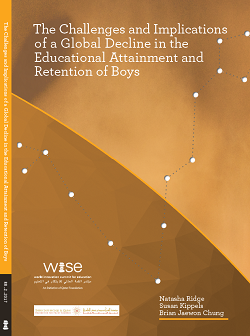National programmes that involve fathers in their children’s education can help tackle boys’ underachievement in schools, new research has found.
Fathers who are actively involved boost to their children’s self-esteem, which leads to more positive outcomes, according to the research by Natasha Ridge, Susan Kippels and Brian Jaewon Chung of the Sheikh Saud bin Saqr Al Qasimi Foundation for Policy Research in the United Arab Emirates.
Commissioned by the World Innovation Summit for Education (WISE), the research found that it is especially important for fathers to act as “strong role models” for their sons when it comes to learning, as their increased involvement sends a positive message about the value and importance of education.
Recent exams data shows that boys’ performance continues to lag behind that of girls at both primary and secondary level. At key stage 2, girls outperformed boys in all areas this year, beating them by seven percentage points in the reading test. And despite evidence that they are closing the gap in some subjects, boys remain behind at GCSE.
The WISE report, entitled ‘The challenges and implications of a global decline in the educational attainment and retention of boys’, found that the rise of automated jobs is making it more important than ever to re-engage boys and men with education.
Jobs that are “typically the purview of working class males” are changing significantly, and boys and men will soon need to find new purpose in their lives through education.
Fathers can make a difference by simply reading to their children more often, as this helps to dispel the myth that reading is a feminine activity. It gives boys “permission” to love books and reading without being seen as “girly”, according to the paper. 
Reading schemes for fathers that begin when their children are babies could be run by local schools, hospitals, or community health centres, it suggested.
The research also recommended programmes for parents to provide awareness of, and strategies to address, the negative impact of too much online gaming.
Initiatives to increase the numbers of men entering and completing teacher-training programmes should also be considered, and be accompanied by “boy-friendly approaches”.
Internationally, the study proposed an online portal that could act as a hub to share helpful resources relating to educating boys and men. This sharing of good practice could be reinforced by the introduction of a global award for innovative schemes that support at-risk boys and their families, it said.
The World Innovation Summit for Education (WISE), an initiative of Qatar Foundation, will be held in Doha November 15-16. Schools Week is the official media partner.


Your thoughts